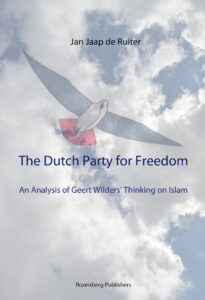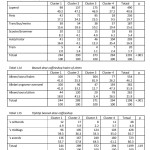The Dutch Party for Freedom. An Analysis of Geert Wilders’ Thinking on Islam – Wartime
1 Comment There’s been a lot of talk about Geert Wilders ever since he started his own party, the Dutch Freedom Party. He is prominently present in Dutch politics and that is how the world got to know him. His party has been very successful and from October 2010 until April 2012 it supported the minority government of Liberal Conservatives and Christian Democrats led by Prime Minister Mark Rutte (Liberal Conservative) in exchange for a number of demands.
There’s been a lot of talk about Geert Wilders ever since he started his own party, the Dutch Freedom Party. He is prominently present in Dutch politics and that is how the world got to know him. His party has been very successful and from October 2010 until April 2012 it supported the minority government of Liberal Conservatives and Christian Democrats led by Prime Minister Mark Rutte (Liberal Conservative) in exchange for a number of demands.
Wilders and his party entered the political arena with very strong opinions on Islam and Muslims, basically expressing the view that Islam is not a religion but an ideology. Muslims may be moderate, Islam never is. Islam, he claims, is a threat to Dutch society, to Europe, to the whole world even. When Geert Wilders and his party decided to support the minority government, they could not but also focus on less eye-catching dossiers of a socio-economic nature. The minority government had been in power for a little over a year when Wilders’ party discovered a new issue that would attract everybody’s attention.
In February 2012, it put up a website where people could vent their complaints about Eastern Europeans ‘who steal our jobs and cause innumerable nuisances by their antisocial drinking and shouting behavior’. Even though the website caused an enormous row, in particular in the European Parliament, the party did not withdraw it. Also in February 2012, the Freedom Party started negotiations with the two government parties on major extra budget cuts deemed necessary due to the financial crises in the world. Much to the annoyance of his fellow-negotiators, Wilders pulled out at the last minute, claiming that now that the necessary calculations had been made by the Bureau for Economic Policy Analysis (CPB) he could not live with the financial consequences the cuts would have for his voters, and the government fell. In the weeks before the elections, on 12 September 2012, the Freedom Party focused virtually entirely on ‘the Evil that is Europe’. Muslims or Eastern Europeans were apparently no longer an issue. The parliamentary elections of 12 September 2012 resulted in a major blow to the Freedom Party, which lost nine of its 24 seats. It was the second blow to hit the party, the first one being the downfall of the Rutte government, which was primarily caused by Party leader Wilders. Both events marked a major loss of political power for the Party. This did however not result in the use of a milder discourse when it comes to the Party’s policies and focus on Islam and Muslims. On the contrary.
The appearance of the movie The Innocence of Muslims in September of 2012, followed by the French Charlie Hebdo cartoon affair, and the killing of American ambassador Stevens in Benghazi in Libya caused a worldwide wave of protests, indignation and violence, on both sides, i.e. the anti-Islam block and Muslims themselves, but Party leader Wilders’ comments on what was happening were in no way less harsh in tone than before.
Geert Wilders’ book, Marked for Death. Islam’s War Against the West and Me appeared in the spring of 2012. Given its title, it obviously centers round the ‘classic’ Freedom Party theme of Islam and its title is quite personal. The book received some media attention, both in the United States, where it was published, and in the Netherlands. However, the amount of attention was far less than issues related to Wilders had received previously. I do not know the reasons behind this, but having read the book, and given the permanent bashing of Islam and Muslims, in particular on the Internet, I feel the need to respond to it. Books, however unnoticed they may be at first, can gain considerable influence once the public has discovered them.
I am not unfamiliar with Wilders and his Freedom Party. In 2010, Freedom Party MP Martin Bosma published a book called (in translation) The fake elite of the counterfeiters. Drees, the extreme right, the sixties, useful idiots, the Wilders Group and me. This book presents a detailed description of what the Freedom Party stands for. It contains what I have called its ideology. I responded to this publication in March 2012 by publishing (in translation) The ideology of the Freedom Party. The evil good and the good evil. In it, I analyze the concepts and ideas lying at the basis of Wilders’ party. Basically, there is a handful of points that it holds very strong views on. Its ideology is based on a strictly applied good-evil scheme, adapted from the Biblical verse 20 of Isaiah 5, quoted by Mr. Bosma on the first pages of his book, and alluded to in the title of my book, and it runs as follows:
‘Woe to those who call evil good and good evil, who put darkness for light and light for darkness, who put bitter for sweet and sweet for bitter’
With this verse in mind, the ideology of the Freedom Party regards Christianity, Jews and Israel, monoculturalism, and ordinary people as good, whereas Islam, leftist political parties, multiculturalism and the elite are considered evil. There are hardly any exceptions to the rule.
I was not surprised to encounter the same black-and-white thinking in Marked for Death. Islam’s War Against the West and Me. Wilders follows the path of his party ideologue Bosma. Apart from it being written in English, the book also differs from Bosma’s in terms of focus. For reasons that so far have remained obscure to me, it appears to be directed at an American audience rather than the Dutch population, whose elites would have no problems reading it, while most of it would escape the common man and woman.
It was suggested, when the book came out, that it could be seen as a public application by Wilders for membership of one of the famous American think tanks, which Ms. Hirsi Ali, a former Liberal Conservative MP in the Netherlands, had joined as well. I do not know if there is any truth to this, and frankly I am not particularly interested in this question either. I find it much more important that Wilders’ book in the English language should receive a certain amount of feedback, and in English as well. From a broader perspective I notice that Wilders is not the only one who is active in framing this Islamization claim. It is spread by a very strong current, in particular on the Internet. Even if Wilders would disappear from active politics, his ideology won’t disappear with him.
Marked for Death. Islam’s War Against the West and Me consists of 13 Chapters, preceded by a Foreword by Mark Steyn, a Canadian journalist. It ends with notes and an index. The present pamphlet reviews Marked for Death in four small chapters, focusing on key concepts arising from it: Truth, Culture, Ideology and Solution. The present section, Wartime, precedes these four; the concluding section is called The speck in your brother’s eye.
The title of this pamphlet was taken from the Gospel of Matthew (7:3) where Jesus says: ‘Why do you see the speck that is in your brother’s eye, but do not notice the log that is in your own eye?’
It was this verse that crossed my mind when I was reading Wilders’ book. The author is so utterly convinced of his mission and the evil nature of his adversary that he loses sight of reality. Now, everybody has the right to write whatever they want, everybody has the right to express their views, I do not contend that, but I do feel that this book should not remain unchallenged. Should the thoughts of this book find their way into a political program and actually be carried out; the inevitable result would be war.
Not a war started by Islam against the world and Geert Wilders, but a war against Islam, a war against Muslims. Wilders is distrustful of Islam’s perceived struggle for world domination. But Islam is not unique in this respect. It shares this drive to spread its message all over the world with that other great world religion, Christianity. In essence, Wilders’ strategy is similar to the perceived strategy of Islam: to combat this religion, or, in his terms, this ideology, until it ceases to exist, as he tells us in the last chapter of his book.
What Wilders demands of Islam and Muslims, is quite unambiguous: They are to disappear, to cease to exist.
His writings contain a disastrous message to the world, as disastrous as Wilders perceives Islam to be. I hope that his program will never be realized and that this pamphlet will in some way be able to contribute to that.
Next Chapter: http://rozenbergquarterly.com/?p=4789
You May Also Like
Comments
One Response to “The Dutch Party for Freedom. An Analysis of Geert Wilders’ Thinking on Islam – Wartime”
Leave a Reply








April 10th, 2013 @ 7:14 pm
[…] Chapter One – Wartime Chapter Two – Truth Chapter Three – Culture Chapter Four – Ideology Chapter Five – Solution Chapter Six – The Speck In Your Brother’s Eye […]